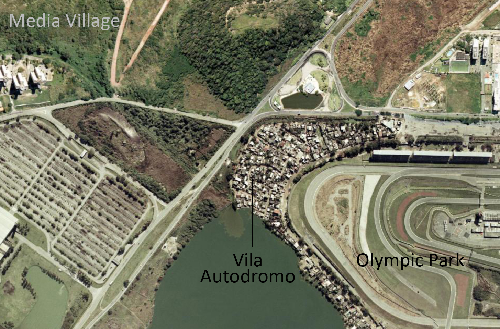RIO DE JANEIRO—The campaign against forced evictions in Rio in the lead-up to the city’s mega-events celebrated a victory as the favela community of Vila Autódromo, adjacent to the Olympic Park site, secured its permanence after years of struggle. The outcome guarantees potentially displaced residents the choice between remaining within the community, or taking up government sponsored alternatives elsewhere.
Mayor Eduardo Paes agreed to the conservation of the favela community during a meeting with the residents association on Friday, August 9th. The Association of Residents, Fishermen, and Friends of Vila Autódromo (AMPAVA) stated afterwards, “After years of resistance and struggle, Vila Autódromo achieved a commitment from the Mayor: Vila Autódromo and its residents will not be removed.”
Work has already started on the proposed new site for displaced residents known as the Carioca Park. The Mayor had defended the relocation, urging that, “I wanted to have an option for these people. Now the city has the land and has designed Parque Carioca [Carioca Park] … All this within 500 meters of Vila Autódromo.”
It appears the compromise offers the best of both worlds to the residents, giving the option to stay or move to new housing. “The apartments at Parque Carioca are for really needy people and [the area has] schools,” Paes added.
According to Theresa Williamson, executive director of nonprofit NGO Catalytic Communities, the decision means “any families along the water’s edge that require resettlement will be offered housing within the community, at the nearby Parque Carioca, or market-value compensation.”
A negotiation group consisting of residents and technical advisers to the Mayor was established and any decisions will be subject to approval by resident assemblies. The basis for the urbanization project will be the Popular Plan; “developed through a series of studies and participatory meetings between the community and urban planners from two federal universities,” Williamson explained.
The small community, on the banks of Lake Jacarepaguá, had been facing eviction since 1993 when professed environmental concerns precipitated the removal of several favelas in the Zona Oeste (West Zone). Vila Autódromo residents took the case to court, securing land titles the following year.
In 2007 the courts once again intervened to preserve the community when it was targeted for displacement during the Pan-American Games. After the city won the Olympic bid in October 2009, however, the Mayor announced that imminent eviction would take place to secure the perimeter of the anticipated Olympic Park.
In January 2012 citizens won a temporary stay against the project but bidding soon resumed amid alternating justifications for their removal. Since then residents have conceived and presented their Popular Plan for on-site upgrades and, more recently, organized protests following undue pressure from government employees on individuals to waive their leases. Paes himself admitted the processes had been “poorly conducted.”
Williams was optimistic that the decision may have positive ramifications for others across the city. “Ideally this constitutes a change of heart and recognition that favelas are an integral and important part of what makes Rio Rio, and that recognizing their qualities and contributions to the city, and developing policies based on this, is on the cards”, she stated.
Earlier in the week the Mayor had met with the Popular Committee on the World Cup and the Olympics, an advocacy group comprising of human rights organizations, citizens and academics which emerged following the Pan-American Games in 2007 to defend housing rights. The Committee presented their report on mega-events and human rights violations in Rio de Janeiro and emphasized that over 40,000 citizens faced threats to their housing rights as families from 26 communities had already lost their homes.
In 2011, the IBGE (Instituto Brasileiro de Geografia e Estatistica) released the findings from its 2010 census which state that 22.03 percent of the 6,323,037 residents of Rio de Janeiro live in favelas, or ‘substandard’ and irregular housing communities. Although the total city population grew only 3.4 percent, growth of favela population of 27.65 percent in ten years.














